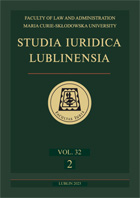“Laissez-Faire” Principle in Tax Law during the Crises
“Laissez-Faire” Principle in Tax Law during the Crises
Author(s): Michal RadvanSubject(s): Economic policy, Law on Economics, Public Finances, Fiscal Politics / Budgeting
Published by: Wydawnictwo Naukowe Uniwersytetu Marii Curie-Sklodowskiej
Keywords: economic crises; tax law; public debt; tax;
Summary/Abstract: In the last three years, the whole world has been struck by several crises. These extraordinary circumstances made many governments intervene much more in the economy, including tax law amendments. Many countries, including the Czech Republic, decreased several taxes or even abolished some as a kind of subsidy. This has resulted in a sharp rise in the public debt. The paper’s main aim and also the hypothesis to be confirmed or disproved is to answer the question of whether it would not be better to leave tax systems untouched in times of economic and other crises. To meet the contribution objectives, the IMRaD structure of the article is being used. The research part indicates amendments to the tax acts in the recent three years, justified on the grounds of the economic crises caused by the COVID-19 pandemic or consequences connected with the Russian invasion of Ukraine. In the discussion, the relationships between the new legal norms and the legal behavior of taxpayers are predicted, and the effects of legal regulation on the economic behavior of taxpayers are explained. Legal amendments also affect public budgets’ revenues. In conclusion, the strengths and weaknesses of de lege lata regulation in the study area are identified, and amendments de lege ferenda are suggested.
Journal: Studia Iuridica Lublinensia
- Issue Year: 32/2023
- Issue No: 2
- Page Range: 225-247
- Page Count: 23
- Language: English

